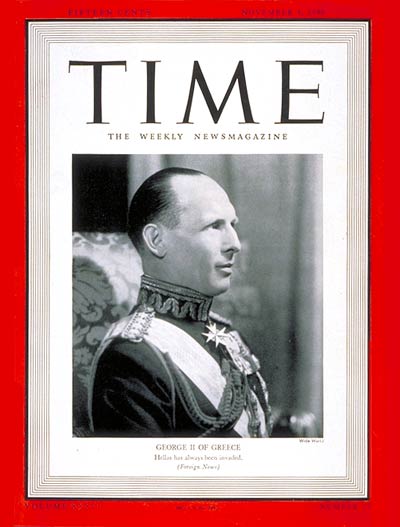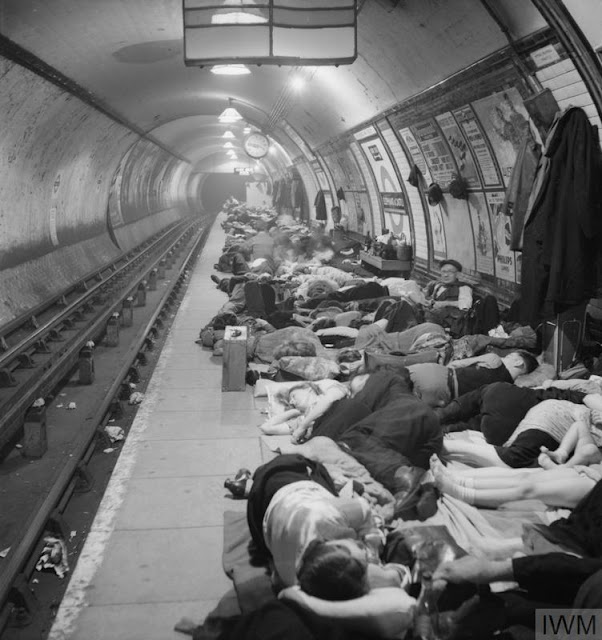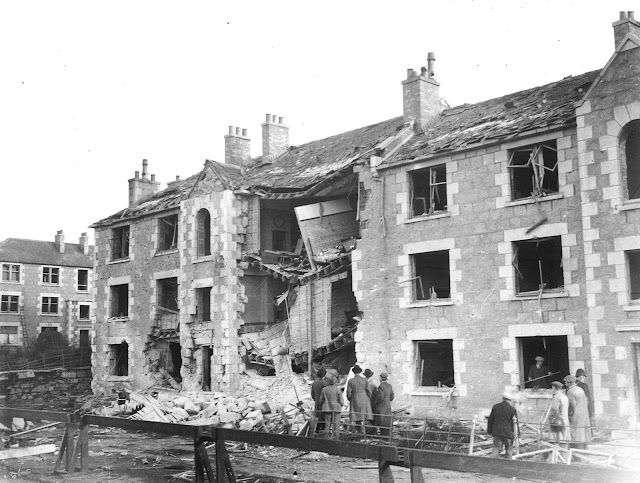Monday 4 November 1940
 |
| U-47 (Günther Prien) on its ninth patrol, operating out of Lorient, during November 1940. It will be in the North Atlantic until 6 December. |
There are reports that the Greeks are led by guerrilla leader Varda, who is described as an 80-year-old veteran of the Balkan War decades earlier. This appears to be a bit fanciful but is an example of the type of myth-making going on among the Greeks.
Greek 9th Infantry Division and 15th Infantry Division continue attacking across the Albanian border in the Koritsa sector, making small gains.
Along the coast, the Battle of Elaia–Kalamas continues. The Italian Littoral Group attempts to cross the Kalamas River, which the Greeks are using as a defensive shield. The Italians sustain heavy casualties and make little progress due to the winter weather, minefields, inadequate equipment, and hesitant leadership. The last of the Greek forces retreat across the river in good order. During the night, the Italian Siena Division manages to cross the river around Tsifliki in Thesprotia. It breaks through the Greek battalion defending there. Greek Major-General Nikolaos Lioumbas orders a withdrawal to the south of the Acheron River. The Italians are continuing their advance here, but nowhere else.
RAF Blenheim IF fighters fly their first patrol from airfields in Greece.
 |
| Time Magazine, 4 November 1940. |
RAF Bomber Command attacks the Channel ports Le Havre and Boulogne. Other bombers, based on Crete now, attack the Italian naval bases at Bari and Brindisi, and also the port of Santo Quaranti in Albania, the principal port for the Epirus and Macedonian fronts.
The Luftwaffe begins moving some units from Denmark and Norway to France. The first to go is Hptm. Franz-Heinz Lange’s II./JG 77, which transfers from Aalborg to Brest-Guipavas.
Hans Philipp, Staffelkapitän of 4./JG 54, is awarded the Ritterkreuz for having achieved a dozen victories.
Battle of the Atlantic: U-99 (Kplt. Otto Kretschmer) finishes off the armed merchant cruisers HMS Laurentic and HMS Patroclus and British freighter Casanare in the early hours of the morning (discussed in the entry for 3 November 1940), then sneaks away. Otherwise, the day is unusually quiet at sea.
The British Home Fleet begins a massive move, with battleships HMS Nelson and Rodney leading a flotilla from Rosyth to Scapa Flow.
Italian submarine Bianchi, transiting the Strait of Gibraltar, sustains damage from a London flying boat and destroyer HMS Greyhound. It puts into port at Tangier.
French destroyers Mameluck, Fleuret, Epee, and Lansquenet enter sail past Gibraltar into the Mediterranean. This continues a period when French ships transit the Strait of Gibraltar with little interference. The British seem confused as to how to handle French naval movements and thus do nothing.
Convoy OB 239 departs from Liverpool, Convoy FN 327 departs from Southend, Convoy AN 6 departs from Port Said (bound for Greece), Convoy SL 54 departs from Freetown, Convoy BS 8 departs from Suez bound for Aden.
 |
| "Civilians sheltering in Elephant and Castle London Underground Station during an air raid in November 1940." © IWM (D 1568). Photo by Bill Brandt. |
Royal Navy cruiser HMS Ajax continues shuttling troops between Alexandria and Suda Bay, Crete. Today, it departs Alexandria loaded with troops of the 14th Armoured Brigade HQ, in the company of Australian cruiser HMAS Sydney.
The Royal Navy begins Operation MB 8, a supply convoy. It involves subsidiary operations:
- Operation Coat (supply convoy to Malta)
- Convoy MW 3 (empty freighters traveling to Malta)
- Convoy ME 3 (four empty freighters traveling from Malta to Alexandria)
- Convoy AN 6 (tankers traveling to Greece)
- Operation Crack (attack on Cagliari by HMS Ark Royal)
- Operation Judgment (attack on Taranto by HMS Illustrious).
The British War Cabinet, led by Winston Churchill, decides to beef up its bomber fleet on Malta and elsewhere in the Mediterranean. Churchill's view is that only air power can help Greece quickly enough to save it. Some 24 Wellington bombers will be operating out of Malta, with 34 Hurricanes sent to Greece itself and 32 Wellingtons sent to Egypt via Malta.
 |
| Bomb damage at Wellington Road, 4 November 1940. |
Commander-in-chief army will be prepared, if necessary, to occupy from Bulgaria the Greek mainland north of the Aegean Sea. This will enable the German air force to attack targets in the eastern Mediterranean, and in particular those English air bases threatening the Romanian oil fields.This will eventually turn into Operation Marita.
The meeting establishes that the entire "peripheral strategy" is oriented around occupying air bases with which to attack British assets. Thus, while it is not all directed at British possessions, it is intended to provide the means to strangle England. As for Operation Felix, that remains on the front burner but lacks the one thing necessary for it to happen: Spanish leader Franco's active participation, of which Hitler remains hopeful.
There also is a discussion about fortifying French colonies in Africa and other operations to take Portugal, the Azores, the Canaries, Madeira and part of Morocco. Once again, these are directed against Britain, in the hopes of shutting off the Mediterranean and providing bases to attack British convoys. These would all require a working military agreement (Zusammenarbeit) between France and Germany, which the OKW is trying to negotiate via the armistice commission. The meeting involves a lot of wishful strategic thinking and few concrete decisions, basically because the predicates - cooperation by Spain and Vichy France - remain elusive.
US Military: Cruiser USS Louisville arrives in Buenos Aires on its "Show the Flag" mission.
Spain: Spain incorporates the Tangier International Zone, which formerly had been an international condominium, into Spanish Morocco. Antonio Yuste becomes the Military Governor. Britain immediately views this move with deep suspicion and worries that Spain will fortify the region while rejuvenating Hitler's hopes of taking Gibraltar via Operation Felix. In fact, while Britain is right to be worried, this solidification of Spanish control (it first occupied the territory on 14 June 1940) is of long-term benefit to the Allies. Spain has no intention of fortifying this strategic area and reassures Britain on that point, also guaranteeing its international rights there. Tangier potentially controls access to the Mediterranean and could threaten Britain's base at Gibraltar, but this move ultimately helps to keep the area out of Axis hands. That is, assuming that Spain does not join the Axis, another thing that Franco (secretly) does not intend to do but is busy making it appear that he does. This is another in a sequence of Franco moves that appear to be of aid and comfort to the Axis, but in fact, will benefit the Allies. His actual position will become clearer much later in the war.
American Homefront: The US Presidential election is tomorrow, 5 November 1940. President Roosevelt is a heavy favorite to win a third term.
 |
| Newsweek Magazine, 4 November 1940. |
November 1940
November 1, 1940: Hitler Irate
November 2, 1940: U-31 Sunk - Again
November 3, 1940: Kretschmer's Master Class
November 4, 1940: Spain Absorbs Tangier
November 5, 1940: Jervis Bay Meets Admiral Scheer
November 6, 1940: San Demetrio Incident
November 7, 1940: Galloping Gertie
November 8, 1940: Italian Shakeup in Greece
November 9, 1940: Dutch Fascists March
November 10, 1940: Fala and Doc Strange
November 11, 1940: Taranto Raid
November 12, 1940: Molotov Takes Berlin
November 13, 1940: Molotov Foils Hitler
November 14, 1940: Moonlight Sonata
November 15, 1940: Warsaw Ghetto Sealed
November 16, 1940: France Keeps Battleships
November 17, 1940: Malta Hurricane Disaster
November 18, 1940: Hitler Berates Ciano
November 19, 1940: Birmingham Devastated
November 20, 1940: Hungary Joins Axis
November 21, 1940: Dies White Paper
November 22, 1940: Italians Take Korçë
November 23, 1940: U-Boat Bonanza!
November 24, 1940: Slovakia Joins In
November 25, 1940: Molotov's Demands
November 26, 1940: Bananas Be Gone
November 27, 1940: Cape Spartivento Battle
November 28, 1940: Wick Perishes
November 29, 1940: Trouble in Indochina
November 30, 1940: Lucy and Desi Marry
2020
No comments:
Post a Comment